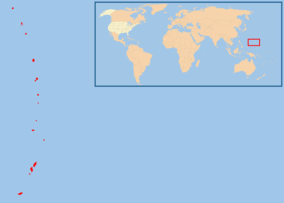Gun laws in the Northern Mariana Islands

Gun laws in the Northern Mariana Islands regulate the sale, possession, and use of firearms and ammunition in the Commonwealth of the Northern Mariana Islands. As the Northern Mariana Islands is a commonwealth of the United States, many U.S. federal laws apply, as well as Constitutional rulings and protections.[1][2]
Summary table
| Subject/Law | Long guns | Handguns | Relevant statutes | Notes |
|---|---|---|---|---|
| Permit to purchase? | Yes | Yes | A license is required to purchase guns or ammunition. | |
| Firearm registration? | No | No | Registration of firearms has been ruled unconstitutional.[3][4] | |
| Assault weapon law? | No | No | Ban on assault weapons was ruled unconstitutional.[3][4] | |
| Magazine capacity restriction? | Yes | Yes | No magazines over 10 rounds.[1] | |
| Carry permits issued? | No | No | Concealed carry remains illegal. | |
| Open carry? | No | Yes | The general ban on carrying operable firearms in public was ruled unconstitutional. Lawful gun owners may carry loaded handguns openly as long as other laws are not violated, such as gun-free zones.[3][4] | |
| NFA weapons restricted? | Yes | Yes | Short barreled shotguns, short barreled rifles, machine guns, suppressors, and grenade launchers are prohibited. | |
| Peaceable journey laws? | No | No | Federal law (FOPA) applies. |
History
Weapons Control Act
Under the Weapons Control Act, all firearms including automatic weapons, semi-automatic assault weapons, and handguns were prohibited from civilian possession. Civilians could only own .410 shotguns and .22 calibre rifles with a license. They also could only own ammunition for those types of firearms with a license; possession of any other type of ammunition, whether the person had a license or not, was illegal.[5]
In the year 2000, House Floor Leader Oscar M. Babauta sponsored a bill that would amend the Weapons Control Act to allow the use of firearms on shooting resorts. Proponents of the bill stated that it would lure investors while detractors of the bill worried it would harm public safety. The House approved the bill on a narrow vote.[6]
Radich v. Guerrero
In 2014, David J. Radich, a US Navy Gulf War veteran, and his wife Li-Rong Radich sued James C. Deleon Guerrero, then the commissioner of the Department of Public Safety (DPS), for violating their right to keep and bear arms from the Second Amendment to the United States Constitution.[7] The judge Ramona V. Manglona ruled the case in favor of the Radiches on March 28, 2016 and decreed that the NMI ban on handguns and ammunition were unconstitutional.[8] The ruling also overturned the ban on importation of handguns and handgun ammunition, the implicit ban on receiving a weapons identification card for self-defense purposes, and the ban on lawful permanent residents obtaining a weapons identification card.[9]
The Parent Teacher Student Association (PTSA) of Tanapag Middle School attempted a motion to intervene on the case's ruling because they believed it would endanger students. Judge Manglona rejected the motion, stating that the older gun control laws had been repealed, thus rendering their motion moot.[10] The Tanapag PTSA took its appeal to the United States Court of Appeals for the Ninth Circuit.[11]
Special Act for Firearms and Enforcement (SAFE)
In response to the Radich decision, in early April, CNMI governor Ralph Torres approved gun-control legislation which imposed a $1,000 excise tax on handguns and established certain gun-free zones on the islands.[12] This legislation became known as the Special Act for Firearms and Enforcement, or SAFE Act.
Murphy v. Guerrero
In a lawsuit, US Army veteran and teacher Paul Murphy challenged the constitutionality of the $1000 excise tax on handguns; the requirement that he obtain a license and register his weapons; the restrictions on how he may store his weapons at home; the ban on large capacity magazines; the ban on rifles in calibers above .223; the ban on "assault weapons"; and the ban on transporting operable firearms.[3][4]
On September 28, 2016, Judge Manglona ruled the following provisions as unconstitutional:[3][4]
- $1000 excise tax
- Registration requirement
- Ban on calibers above .223
- Assault weapons ban
- Transportation (and carry) of operable firearms ban
The following provisions were upheld:[3][4]
- Licensing requirements
- Firearms storage restrictions
- Large capacity magazines ban
These court rulings are reflected in SAFE II, the revised draft version of the SAFE Act.[3][4]
References
- 1 2 "Northern Mariana Islands" (PDF). Handgunlaw.us. Retrieved August 7, 2014.
- ↑ "Northern Mariana Islands Gun Law Guide" (PDF). Bureau of Alcohol, Tobacco, and Firearms. Retrieved August 7, 2014.
- 1 2 3 4 5 6 7 Bagnol, Raquel C. (September 30, 2016). "US court: $1,000 tax on handguns unconstitutional". Marianas Variety. Retrieved October 2, 2016.
- 1 2 3 4 5 6 7 "Murphy v. Guerrero" (PDF).
- ↑ "Northern Mariana Islands Law" (PDF). Firearms Law. Northern Mariana Islands Legislature. Retrieved August 7, 2014.
- ↑ "Public hearing on gun control in Rota". Saipan Tribune. September 22, 2000. Retrieved April 17, 2016.
- ↑ De La Torre, Ferdie (September 8, 2014). "Couple sues to challenge constitutionality of NMI gun law". Saipan Tribune. Retrieved April 17, 2016.
- ↑ Bagnol, Raquel C. (March 30, 2016). "US court: NMI handgun ban unconstitutional". Marianas Variety. Retrieved April 17, 2016.
- ↑ "Federal Judge Rules Northern Mariana Islands Handgun Ban Violates 2A". Second Amendment Foundation. Retrieved March 28, 2016.
- ↑ De La Torre, Ferdie (June 1, 2016). "Judge denies PTSA's motion to intervene for appeal". Saipan Tribune. Retrieved June 15, 2016.
- ↑ De La Torre, Ferdie (June 14, 2016). "PTSA brings gun control issue to 9th Circuit". Saipan Tribune. Retrieved June 26, 2016.
- ↑ Villahermosa, Cherrie Anne E. "New gun-control law imposes $1,000 excise tax on pistols". Marianas Variety. Retrieved April 17, 2016.